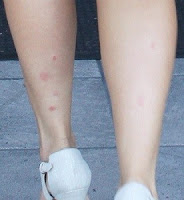 |
| Psoriasis on Kim K's legs |
Psoriasis is a disease that is characterised by scaly, itchy rashes and redness on the skin. This disease (which has a large hereditary component) takes on many patterns. The most severe form of psoriasis is called erythrodermic. Erythrodermic affects the entire skin. The most common form of the disease is chronic plaque psoriasis. People with chronic plaque psoriasis will notice flat plaques on their elbows, knees and lower back.
Some people will notice the disease on their scalps while others experience Flexural psoriasis. Flexural psoriasis affects the body folds and you can see smooth, well-defined patches in those areas. People that are sensitive to the sun will experience photosensitive psoriasis.
Acute guttate psoriasis is a very serious type that creates widespread small patches on the body. If the psoriasis affects your mouth, it is called intraoral psoriasis and if the symptoms are seen only on palms and soles it is called palm-plantar psoriasis.
How is psoriasis treated?
 |
| Psoriasis on Kim K's legs |
If you notice these rashes, you should consult a doctor immediately.
Topical therapy for scalp psoriasis includes corticosteroids, tazarotene, anthralin, calcipotriol/calcipotriene and tars. Topical medications are available in the form of creams, lotions, ointments, gels, foams and shampoos. These medications can be applied once or twice daily, for several weeks or months.
ReplyDeletepsoriasis free for life